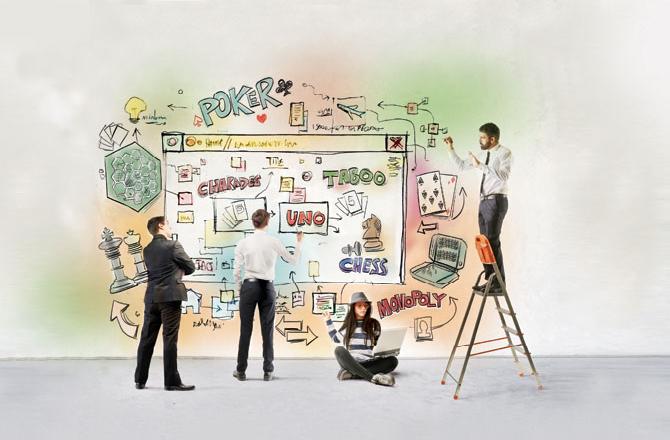In corporate workplaces, games that involve teams can promote healthy competition and teach you to work well with others to achieve a common goal.
Deepak Dhayanithy is a professor with an unusual predilection — he is an avid fan of the popular (and somewhat infamous) card game, poker. But before you rush to conclusions, let us clarify that Dhayanithy isn’t exactly a professional gambler. Instead, he uses poker as a tool to teach bright-eyed students the fundamentals of strategic management at the prestigious Indian Institute of Management, Kozhikode. Dhayanithy asserts that poker is far more effective than most course books when it comes to making quick decisions, dealing with uncertainties and reading your opponents’ body language. These are all skills, he says, that will come in handy in corporate boardrooms, where managers must think quickly and factor in the long term while making decisions that will impact the entire organisation.
While this attitude might strike you as a stark departure from the traditional mindset of games being a distraction and/or a waste of time for students struggling with demanding coursework, there are more like Dhayanithy who believe in the instructional value that games.

Priyanka Varma
Textbook vs playground
Dr Lakshmi Mohan, director of ITM Business School, says, “Games promote active learning by engaging students and creating stimulating learning experiences. This is why games such as building blocks and jenga have been assimilated into the pedagogy of many management institutes. Additionally, simulation exercises such as Markstrat can also prepare students to face real-world business situations.” Clinical psychologist and counsellor Priyanka Varma adds, “Even with younger children, we have found that when concepts are introduced in a play format, learners are able to understand and grasp them faster as compared to a more structured method.”
In corporate workplaces, games that involve teams can promote healthy competition and teach you to work well with others to achieve a common goal. “While in a more formal setting, even two friends vying for a raise can target each other and backbite in the process, pitting warring colleagues in a game setting can encourage them to work on their differences without encouraging them to bring the other down,” she says. Importantly, games can hone players’ reasoning, analytical, creative and collaborative skills, adds Dr Mohan, which are essential for successful leadership.

Amit Tripathi
Make the right move
When it comes to selecting games that can make you a better leader, manager or team player, Amit Tripathi, founder of IdeateLabs prefers games that compel players to take action within a limited time frame, defeat competitors tactically and envision complications. These, he says, make you think and react similarly in real-life instances. At the same time, games that encourage critical thinking can teach them to predict how their opponents or competition will react, explains Sudhanshu Rai, chief strategist at Saints Art. Such thinking is essential for senior professionals, who are expected to bring predictive results for their organisations by making management decisions which are critical to the success of the establishment.
Varma recommends selecting games in keeping with your desired goal. If you are eager to improve your communication skills, for instance, she recommends choosing games like Charades or Taboo, which help you to understand how people express themselves. On the other hand, Monopoly or Switcheroo can teach you strategy and to think faster, respectively.
Similarly, while Kaun Banega Crorepati is often used as an ice-breaker during team-bonding sessions, Varma believes that they aren’t particularly effective as they give participants a limited set of options to work with. Instead, she recommends open-ended games that encourage participants to think out of the box, be creative and express themselves.
Like board games, video games too have been experiencing a resurgence, in light of their instructional abilities. Many of these games are also quite short, Varma explains, which makes them an ideal stress-buster. However, she also cautions that visual stimulation can make online games addictive, which is why they are best played in moderation, and that games played in real-time is a better idea.
Games people play
Communication and team-building
Taboo: This can be an excellent way to bond with teammates and improve communication skills, says Varma
Charades: It can help you to read body language better and understand the intent behind actions, Varma says.
Blind drawing: Drawing a picture based on verbal instructions can make you a better listener, says Tripathi.
Human knot: As the team works on physically untangling themselves, the team members are able to work on their lateral thinking, team building, and strategic skills, suggests Dr. Mohan.

Amit Kanodia
Analysis
Chess: It can teach you discipline, and to evaluate risks and identify areas of maximum return on investment). More risk can yield maximum returns, with the right amount of discipline, patience, and control, says Amit Kanodia, CEO of MadOverPoker.
Poker: This game involves many variances, probabilities, and combinations, says Kanodia, which makes it a powerful tool to improve analytical skills
Rummy: It can improve hand-eye coordination and teach you to plan wisely, Kanodia shares.
Battleship: This game tests your ability to make strategic moves while also understanding and predicting those of your opponent, says media and tech entrepreneur Faisal Amin.
UNO: This classic teaches players to engage in competition, know which cards to play and which to hold, in a race to finish first, says Amin

Faisal Amin
Planning
The Settlers of Catan: By demanding effective use and conservation of resources, forecasting and prediction, apart from engaging players’ negotiation skills, it can be a useful tool for managers, says Amin.
Building blocks: Players can use them to create a strategy, says Dr. Mohan. It helps to visualise processes and break them down for better understanding.
Monopoly: Participants learn to allocate resources while acknowledging their limits and gain maximum output. This can help in creating operational strategies keeping in mind long-term objectives, says Rai.



No comments yet. Be the first one to leave a thought.